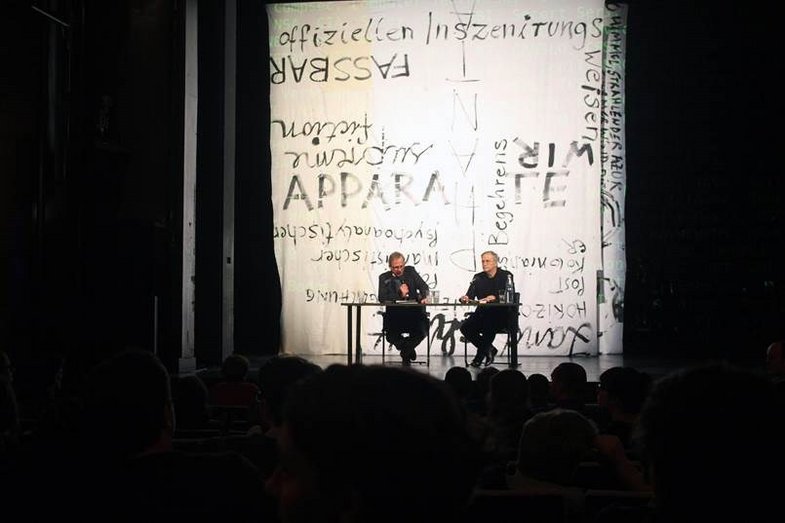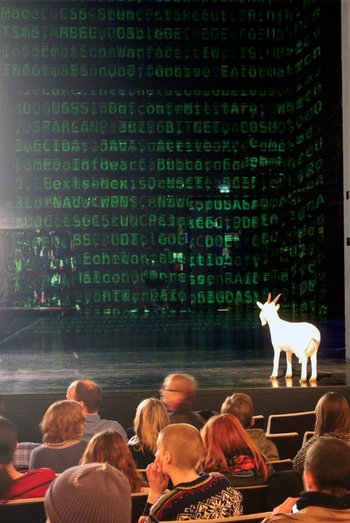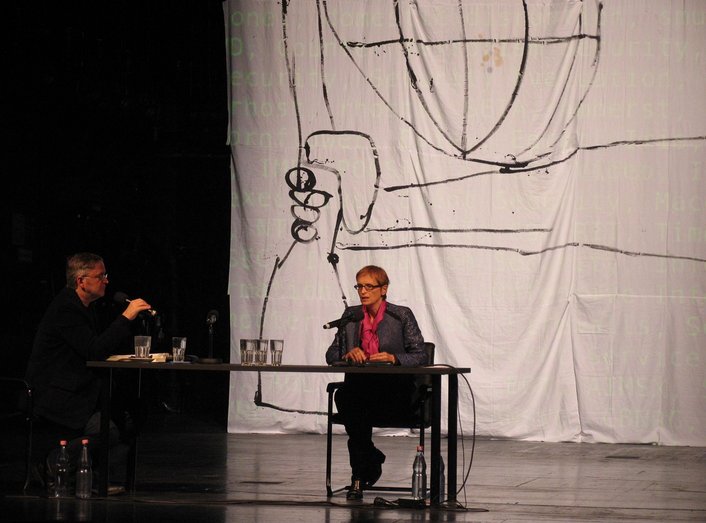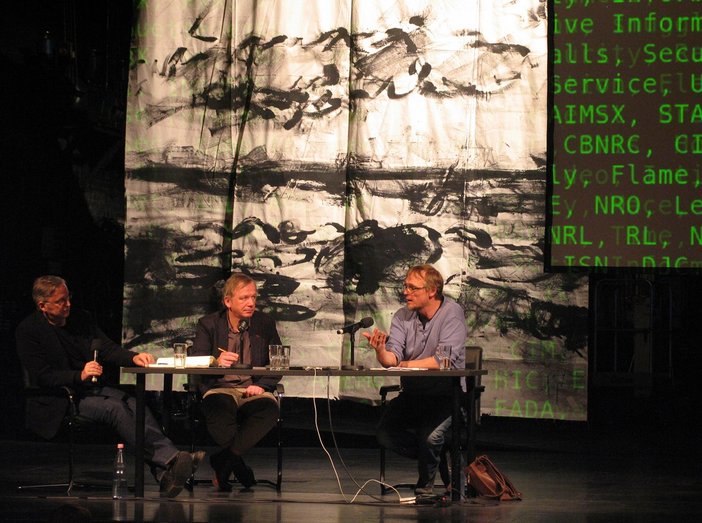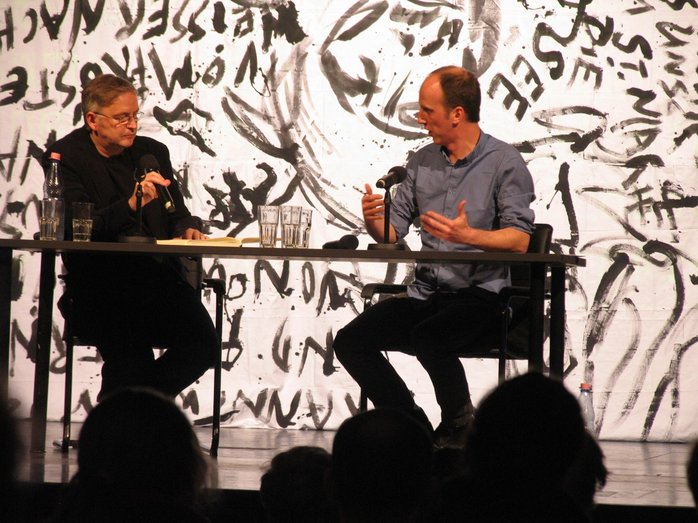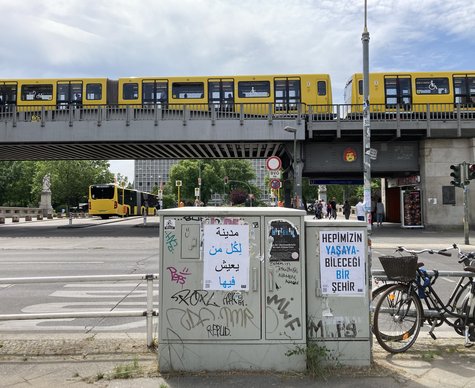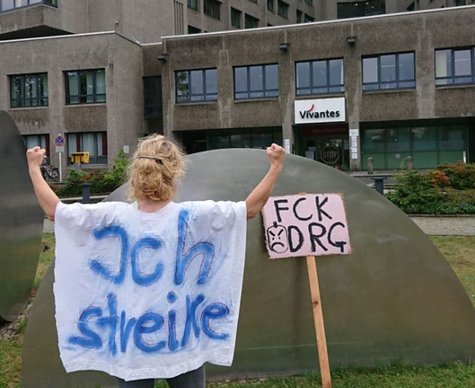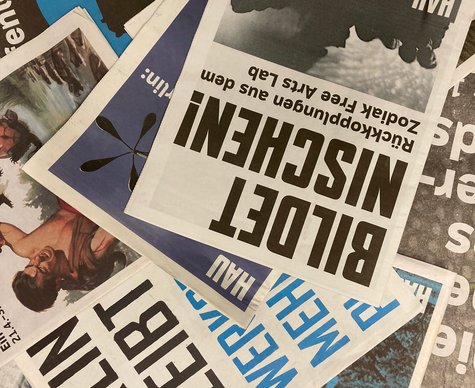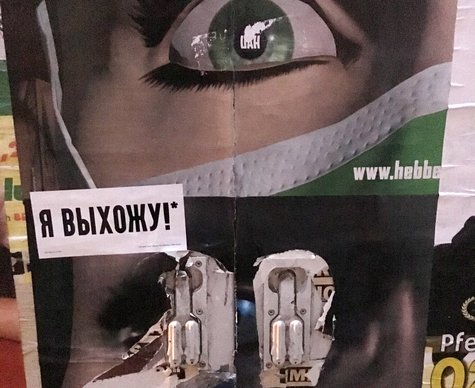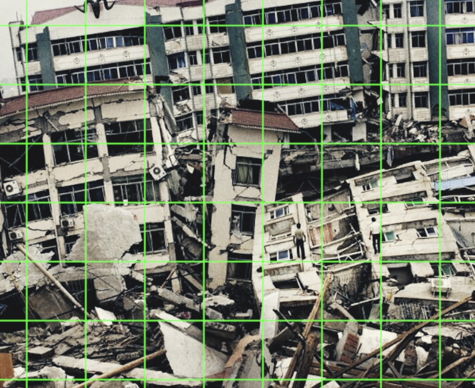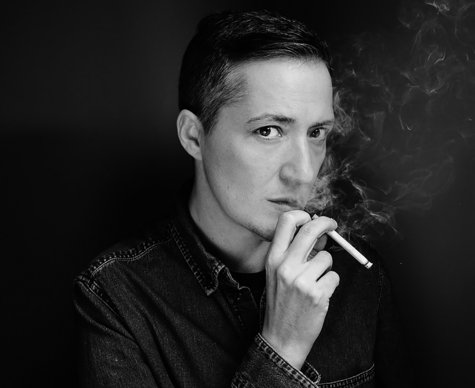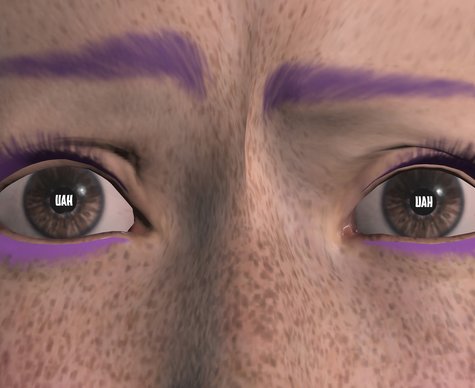Die Politik des Phantasmas
Phantasma und Politik #5
- Dialog
Als Reaktion auf vielfach als katastrophal wahrgenommene Vorgänge in einer radikal sich verändernden Welt wird immer häufiger der Ruf nach einer Kunst laut, die diese Entwicklungen nicht nur beschreibbar macht, sondern auch als Agent gesellschaftlicher Veränderung in die “Wirklichkeit” (oder was man dafür hält) eingreift. Vor diesem Hintergrund hat das HAU Hebbel am Ufer gemeinsam mit dem Kunstteoretiker Helmut Draxler das Projekt “Phantasma und Politik” ins Leben gerufen. Es geht der Frage nach, welche Bedürfnisse sich in der Sehnsucht nach dem Realen artikulieren.
Die fünfte Folge der diskursiven Veranstaltungsreihe ist eine auf zwei Tage angelegte Konferenz. Sie beschäftigt sich aus postmarxistischer, psychoanalytischer und postkolonialer Perspektive mit dem Begriff des "Phantasma" selber. Zur Sprache kommen Rhetoriken, die als Politiken der Angst und des Begehrens die offiziellen medialen Inszenierungsweisen des Politischen bestimmen, insbesondere im Hinblick auf die häufig zu beobachtende Propagierung sozialer Differenz.
Auf der anderen Seite geht es um die Frage, welche Rolle das Phantasmatische für die unterschiedlichen Konzeptionen linker Politik im weitesten Sinn spielen kann. Was ist aus der alten Forderung der 68er-Generation geworden, welche die "Phantasie an die Macht" bringen wollte? Wie ist es um die Phantasmagorie oder generell um die Anrufung des Fiktionalen bestellt? Kann sie uns über eine schlechte Wirklichkeit hinweghelfen?
„Ausgangspunkt des Projekts „Phantasma und Politik“ ist die Frage, wie die Inhalte der unterschiedlichen kulturellen Produktionsformen mit deren Funktionsweisen innerhalb der Institutionen des Kultur- oder Wissenschaftsbetriebs zusammenhängen. Mit dem Begriff des Phantasmas soll einerseits die Gefahr des Phantasmatisch-Werdens etwa von politischen Inhalten im nahtlosen und letztlich wirkungslosen Funktionieren innerhalb dieser Apparate angedeutet werden. Andererseits verweist der Begriff jedoch, nach Jacques Lacans Lesart, darauf, dass die Objekte des Imaginären immer schon mit der symbolischen Ordnung in Zusammenhang stehen; er lässt sich deshalb auch als Ausgangpunkt verstehen, genau jene Verhältnisformen zwischen den Inhalten und den Strukturen zu reflektieren.
Die Tagung „Die Politik des Phantasmas“ wird sich mit den unterschiedlichen Lesarten dieser Verhältnisformen aus psychoanalytischer, postmarxistischer und postkolonialer Perspektive beschäftigen. Auf der einen Seite sollen dabei jene phantasmatischen Rhetoriken zur Sprache kommen, wie sie als Politiken der Angst und des Begehrens die offiziellen medialen Inszenierungsweisen des Politischen bestimmen, insbesondere hinsichtlich des Propagierens sozialer Differenz (die Anderen, die gefährlichen Klassen etc.). Auf der anderen Seite wird es um die Frage gehen, welche Rolle für die unterschiedlichen Konzeptionen linker Politik das Phantasmatische im weitesten Sinn spielen kann: etwa als jene Phantasie, die einmal an die Macht sollte, oder als Phantasmagorie oder generell als ein Fiktionales - im Sinne einer „supreme fiction“ (Simon Critchley) - das über das schlechte Gegebene hinweghilft.
Zusammenhänge, konkrete Beanspruchungen und Bewertungen der unterschiedlichen Formen des Phantasmas sind jedoch höchst umstritten. Der Begriff des Phantasmas zeigt diese Umstrittenheit zumindest an. In ihm werden stets eine Abwehr und der Horizont einer Ermöglichung fassbar; es zeigt und verbirgt sich etwas zugleich. Gerade in dieser Zweischneidigkeit spiegeln sich die gesellschaftlichen Verhältnisse ebenso wie die individuellen Wunschökonomien. Als Schnittstelle zwischen Polizei und Politik, Medien und Form, Inhalt und Struktur bedingt und begleitet das Phantasma jeden Prozess des Politisch-Werdens. Doch wie wäre damit umzugehen? Können gute und schlechte Formen unterschieden werden, und gilt es, die einen zu überwinden und die anderen fruchtbar zu machen? Oder müssen sie eher generell, wie Lacan empfiehlt „durchquert“ werden, um die unheimlichen Dynamiken zwischen ihren unterschiedlichen Formen des Zeigens und des Verbergens sichtbar zu machen? Die strukturellen und diskursiven Bedingungen des eigenen Sprechens zu reflektieren könnte eine Strategie im Umgang mit den Phantasmen sein; eine andere, die Phantasmen zu „durchstoßen“ um ihr Verborgenes und Unbedingtes zu behaupten, wobei Reflexion und Behauptung hier nicht notwendigerweise als Gegensätze erscheinen müssen. Mit Gilles Deleuze könnte es gerade darum gehen, einen solchen Gegensatz zu pulverisieren und eine affirmativ-kritische Lesart der Phantasmen ins Auge zu fassen.“
(Helmut Draxler, Christoph Gurk)
Fr 22.11.2013
18:00 Helmut Draxler / Christoph Gurk, Introduction
18:30 Dominiek Hoens, A Subject Staging Its Own Disappearance. A Lacanian Approach to Phantasm and Politics
19:30 Katja Diefenbach, The Anarchic Principle of Imagination
20:30 Intermission
20:45 Boris Buden, Another Past is Possible
Sa 23.11.2013
15:00 Sami Khatib, Fantasy, Phantasmagoria, and Image- Space. Walter Benjamin's Politics of Pure Means
16:15 Frank Ruda, Elements for an Emancipatory Theory of Sacrifice
17:15 Intermission
17:30 Jelica Šumič Riha, Phantasm in Politics
18:30 Nikita Dhawan / María Do Mar Castro Varela, The Unbearable Slowness of Change: The Phantasm of Ruthless Critique and Radical Politics
19:30 Intermission
20:00 Felix Ensslin, What’s Left to Imagine? The Privation of the Absolute
21:00 Helmut Draxler / Christoph Gurk, Recapitulation
“Szenische Entstaltung”: Stefan Dillemuth, Florian Hüttner / Moderated discussion with the speakers after each lecture / Snacks and drinks at HAU1
Dominiek Hoens:
A Subject Staging Its Own Disappearance. A Lacanian Approach to Phantasm and Politics
This paper has three sections. The first one consists in an attempt to define the Lacanian notion of phantasm and to articulate its logic. In a second part Slavoj Žižek's use of it is juxtaposed with Alain Badiou's elaboration of a 'Lacanian' politics without an (phantasmatic) object. In a third and concluding section I try and show the possible use and limits of thinking politics from a phantasmal point of view, through a discussion of this idea: capital owes you nothing.
Katja Diefenbach:
The anarchic principle of imagination
Since imagination has been integrated into western capitalism in ways in which one is constantly expected to possess oneself in one’s own capacities and to exercise their optimisation, we see the corresponding counter models increasingly gaining prominence – unproductive expenditure, hesitation, tiredness, passivity, impotentiality and the like. These models of a new 'vita contemplativa' tend to miss in how far capitalist modes of subjectivisation proceed at multiple poles: flexibilisation coexists with the immobilisation of life forms, poetisation of the self with the exclusion from any kind of aesthetic sensation or production, the widening imperative of creativity with the hyper exploitation of repetitive labour.
In contrast, departing from the quarrel about the concepts of potentiality in post-Marxist philosophy, I will introduce an anarchic theory of imagination in which the question of politics is tied to the status of affects as catalysts both of liberation and oppression alike. This argument will be based on a theory of a differential constitution of affectivity as it can be found in Spinoza’s 'Ethics'. By showing the cutting lines of conflicts in Agamben’s and Deleuze’s interpretation of that tradition, I will delineate the idea of a politics without prescription. In that, the widely discussed paradigms of political existence – like impotentiality, decision to fidelity, involuntarism, etc. - will not be generalized towards a new norm of acting but rather abandoned in favour of emphasising the inner dynamics and differentiations of political acts that thus become capable of interrupting the conservative effects they imply.
Boris Buden:
Another Past is Possible
It is hard to believe but the fantasies of radical change are in again. History, once more, appears saturated with contingency. Even Utopia seems to be back on its feet. Is this possible in our post-revolutionary, post-historical, post-utopian age? It is indeed but on the other end of time. Now it is the past that has become a new promised land of our imagination where everything might have been different than it actually was—at least in the new growing genre of the so-called alternative histories: what might have been if Socrates was killed in the battle at Delium, 424 B.C., or if Abraham Lincoln had not freed the slaves? Thus, another world is possible, a world without philosophy or a world in which we could buy Obama as slave on eBay. It is only up to our imagination to radically change the past. Is this because there is nothing we can do about our future?
Sami Khatib:
Fantasy, Phantasmagoria, and Image-Space. Walter Benjamin's Politics of Pure Means
My paper is interested in Walter Benjamin’s anarcho-surrealist aesthetics. In his essay on “Surrealism” (1929), he introduced the term 'image-space' ('Bildraum'), which designates a conjunction of sobriety and ecstasy, individuality and collectivity, time and space, corporeal immediacy and figurative presentation. Opening up a “world of universal and integral actuality”, this image-space is an immediate presentation of collective political action without formal political representation (be it party politics or representative democracy). In this talk, I will discuss Benjamin’s image-space with regard to his earlier messianic nihilism and later Marxism.
1. In an early fragment, he introduced the term 'Phantasie', which covers both meanings imagination and fantasy. Benjamin’s intriguing point is that the forms ('Gestalten') of imagination never acquire a stable form, never reach the level of a congealed 'phantasma'. Rather, the amorphous phenomena of imagination proceed through the de-formation ('Entstaltung') of forms ('Gestalteten') like humming sounds or clouds in the visual world. In my paper, I will examine the dissolving structure of these deformations with regard to Benjamin’s early politics of pure means. The latter concerns the anarcho-nihilist deformation of the forms of violence and domination through a de-posing, suspension of state power without establishing a new law, a new authority, or social structure.
2. In his later Marxist writings, the concepts of the image and imagination ('Phantasie') will recur in a different shape, serving as elements of what might be called a theory of the aesthetics of the commodity form. In his reading of Marx’s famous theory of 'commodity fetishism', Benjamin introduces the term 'phantasmagoria'. In short, the phantasmagorias of the world of commodities consist of congealed images, dream-like fantasies, crystallized phenomena of a purely social relation (the value form). In my paper, I will elaborate on the immediate presence of capitalist phantasmagorias and discuss the question whether or to what extent Benjamin’s earlier theories of imagination and image-space are capable of undoing, dissolving, and, ultimately, deforming the forms of the imaginary of the commodity form.
Frank Ruda:
Elements for an Emancipatory Theory of Sacrifice
Of the many categories that might seem to fulfil an essentially phantasmatic function in social as much as in political thought, clearly the category of sacrifice is one of the most prominent ones. A sacrificial act is often considered to make an object or a subject sacred and thus it seems to bring about a dimension which the object/subject in its immediate being does not possess. And this sacrificial act has different modes: it may be negative and destructive (as in terrorism), it may function as model of exchange (as in sacrificing something for attaining what one perceives to be a higher good), or as a way of protecting oneself from the greater loss (as in sacrificing something essentially irrelevant to keep what one does not want to lose), etc. etc.
The paper will argue that traversing the phantasmatic structure of sacrifice can help to answer a crucial question of political emancipation, namely how to become an emancipated subject. It will contend that the sacrificial act needs to be fully appropriated by contemporary emancipatory thought and it will demonstrate why to learn how to become a subject is to learn how to sacrifice oneself.
Jelica Šumič-Riha:
Phantasm in Politics
The theme of this conference turns around the relationship between psychoanalysis and politics. In my presentation, I will use the Lacanian concept of phantasm in order to highlight the homology between the subject of the unconscious and the subject of modern rights. As I am going to argue, this homology sheds light on what constitutes the core of modern politics, namely human properties as the unconscious phantasy of modern politics. Such an approach merely follows the steps of the extremely complex relationship between political philosophy and psychoanalysis.
María do Mar Castro Varela & Nikita Dhawan:
The Unbearable Slowness of Change: The Phantasm of Ruthless Critique and Radical Politics
Unequal access to power and uneven distribution of resources in the current phase of postcolonial late capitalism has spurred a range of critical discourses and movements that seek to reconfigure global hierarchies. From Puerta del Sol to Taksim, from Syntagma to Tahrir Square, street politics seem to have transformed the way power, agency and resistance are being perceived and performed. Having said that, one is increasingly confronted with the uncanny feeling that the more it is claimed that we can and have changed things, the more they seem to remain the same. The utopia of radical change made possible through ruthless critique appears phantasmic when promises and hopes of salvation of the world end in violence and distress.
These ambivalent and paradoxical events confront us to rethink the fundamental relation between political change and the performance of critique. In regarding itself as contesting relations of power, critique aspires to be “heroic”. This raises the questions: What privileged function has critique come to occupy in our political and aesthetic world? How has critique become the indispensible way to emancipation? How does the fantasy of radical change and ruthless critique in fact sustain and reinforce coercive relations of power instead of challenging them? As Marx warns: “The weapon of criticism cannot, of course, replace criticism of the weapon”.
Our talk will examine the dynamics between critique and politics, ethics and aesthetics to explore what it means to perform 'ruthless' critique 'here and now'.
Felix Ensslin:
What’s Left to Imagine? The Privation of the Absolute.
Starting from Lacanian premises, the fundamental phantasm can be thought of as upholding the absolute. The absolute closes the hole in the symbolic order and seemingly guarantees objects of satisfaction. It does so via the imaginary, by positing scenes of satisfaction for the 'jouissance' of the subject. Thus, it is an absolute that is tied to picture-thinking and it envelops thought in the imaginary. However, the symbolic is not absent from the phantasm, as Lacan has argued in Seminar VIII. This is what allows for the traversal of the phantasm, by working through the differences produced by the split between the symbolic and imaginary within the phantasm. However: what’s left to imagine after this traversal? Will a new subject position not simply organize around a new phantasm, will the break with history not simply organize a new imaginary of history, will the revolutionary break not simply lead to a new limitation within the imaginary? This is the old question haunting the tradition of the left’s critique of ideological phantasms. All apologists of gradual change and reform have warned against this emergence of a new phantasm after a radical break. The paper will work through this question in order to explore what role the imaginary could play after a break with the fundamental phantasm organizing the libidinal life of a subject or even a culture.
Gefördert aus Mitteln des Hauptstadtkulturfonds. Präsentiert im Kontext von House on Fire mit Unterstützung des Kulturprogramms der Europäischen Union.
Termine
Spielorte
HAU1
Stresemannstraße 29, 10963 BerlinZwei markierte Parkplätze vor dem Haus vorhanden. Zugang zum Parkett über separaten Eingang mit Lift möglich. Barrierefreie Sanitäranlagen vorhanden. Tickets für Rollstuhlfahrer*innen und Begleitpersonen sind über das Ticketingsystem buchbar. Bei Fragen wenden Sie sich bitte an unser Ticketing- & Service-Team unter +49 (0)30 259004-27 oder per E-Mail an tickets@hebbel-am-ufer.de.
